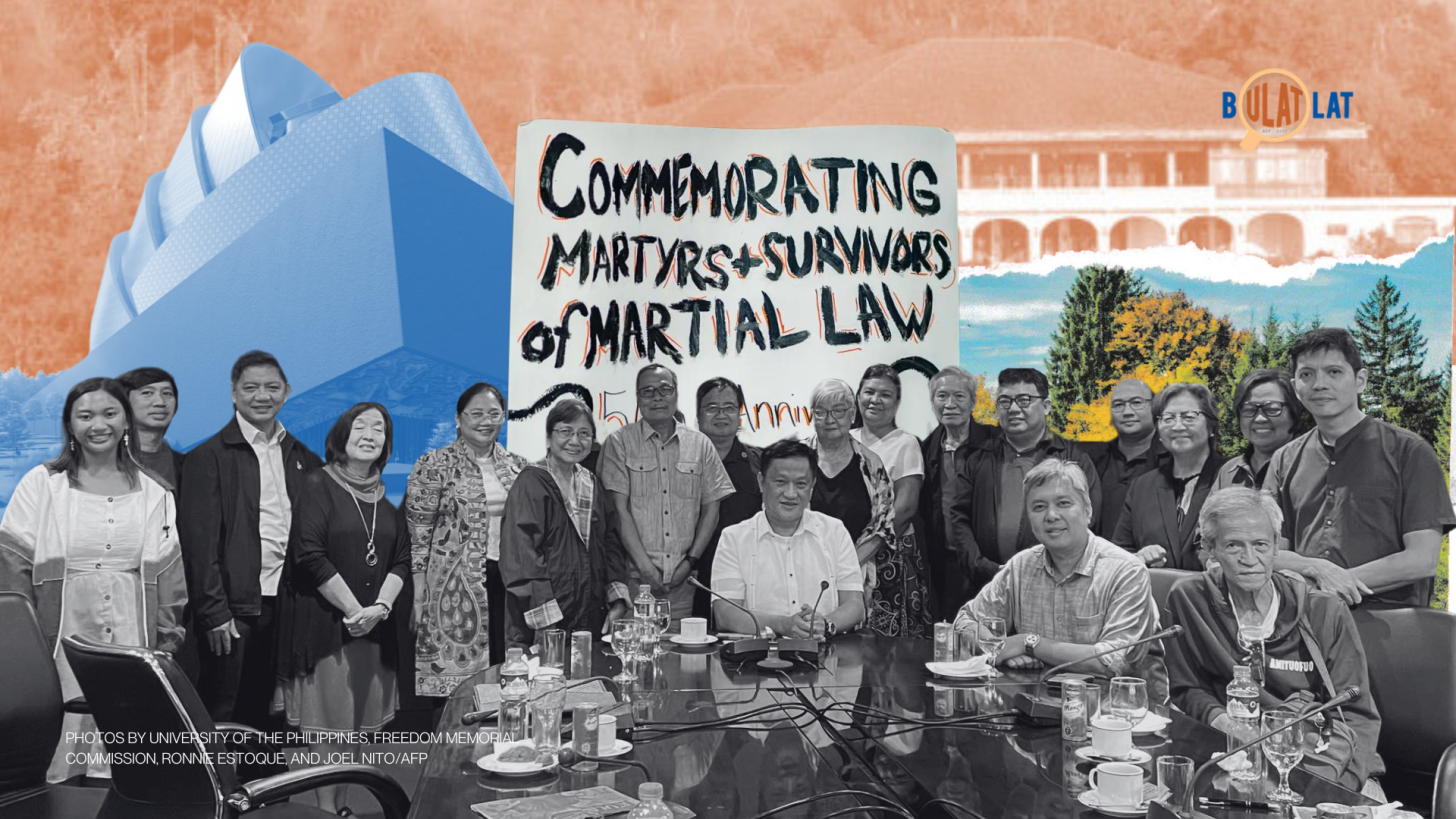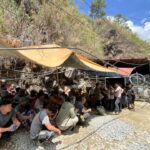The survivors under the banner of Campaign Against Return of the Marcoses and Martial Law (CARMMA) underscored that the fight for justice and accountability, and the struggle against historical distortion and impunity are far from over.
By DOMINIC GUTOMAN
Bulatlat.com
MANILA – Survivors of the Martial law during the dictatorship of Ferdinand Marcos Sr. welcomed the recent developments in their ongoing fight against historical distortion: the Supreme Court’s declaration of the Marcos family’s property in Paoay, Ilocos Norte as ill-gotten wealth and the efforts to expedite the Freedom Memorial Museum in UP Diliman.
The series of events coincided just a few weeks before the annual commemoration of Martial law’s declaration on September 21, 1972.
Despite these victories, the survivors under the banner of Campaign Against Return of the Marcoses and Martial Law (CARMMA) underscored that the fight for justice and accountability, and the struggle against historical distortion and impunity are far from over.
Declaration of ill-gotten wealth in Paoay
The Supreme Court, in a decision promulgated on November 23, 2024 but was made public on Sept. 4, declared that the 57.7 hectares of lands in Barangay Suba, Paoay, Ilocos Norte was an ill-gotten wealth of the Marcos family, which they acquired through a 1978 lease contract between Marcos Sr. and the Philippine Tourism Authority (PTA), which is now the Tourism Infrastructure and Enterprise Zone Authority (TIEZA).
“Considering that the 1978 Lease Contract is void, no rights emanate from it,” the SC decision read. “No one, not even the president, can claim exclusive rights over the property of the State.”
Senior Associate Justice Mavic Leonen penned the 55-page decision, declaring the 1978 Lease Contract between Marcos Sr. and the PTA as void for being unconstitutional.
“This decision is significant because this would be, as far as we know, the first ruling on Marcos’ illegal wealth under the presidency of the son, Ferdinand Marcos Jr., who has repeatedly denied that his family amassed millions worth of wealth during the Marcos Sr. dictatorship,” said CARMMA in a statement.
It was Marcos Sr. himself that declared the Paoay Lake and its extremities in the province of Ilocos Norte as a national park in June 1969, under the Republic Act No. 5631. Almost a decade later, he issued Presidential Decree No. 1554 in June 1978, declaring some lands open to disposition or acquisition.
By December 1978, Marcos Sr. entered into a lease contract with PTA, acquiring the lands. It is also provided in the contract that the PTA will shoulder the cost of the construction of improvements and infrastructure. Meaning, public funds were used for the construction and improvement of the Paoay complex and the Presidential Decree he issued became the leeway for the “acquisition” of lands.
“Based on the SC decision, the Marcoses’ claim on a public land as their own while seated in Malacanang, is one more proof of how the Marcoses used their power to expand their wealth,” CARMMA added.
It is in their hopes, especially in the nearing commemoration of Martial Law, to recover more ill-gotten wealth of the Marcos family. The group also condemned the ongoing cases of human rights violations in the current administration of Ferdinand Marcos Jr.
“At the same time, we condemn the continuing violation of human rights including disappearances, bombing of rural communities, the censorship of films on the basis of its political stand, among others,” said CARMMA.

The Freedom Memorial Museum
Meanwhile, in UP Diliman, a joint meeting between UP, Human Rights Violations Victims Memorial Commission (HRVVMC), and the Martial Law survivors and activists was held on September 5 to discuss the delays in the construction of the Freedom Memorial Museum.
For the survivors, the establishment of the Freedom Memorial Museum aims to preserve memories of atrocities, educate the public, advocate for justice, shape collective memory, and support the healing and reconciliation process for victims, especially in the context of Martial Law in the Philippines.
Under the Human Rights Victims Reparations and Recognition Act of 2013 (RA 10368), the museum shall be established and shall have an appropriation of at least P500 million ($ 8.9 million). The names of the victims shall be inscribed on a Roll, whether they opt to seek reparation or not.
A budget hearing at the House of Representatives on September 3 revealed that the UP Diliman has yet to act on a turnover document submitted by the HRVVMC, delaying the construction of the Freedom Memorial Museum for approximately 20 months.
The museum will be established on the premises of UP Diliman, particularly in the area where the existing UP Campus Management Office (CMO) is built. However, building the museum requires relocation of the UP CMO building.
This prompted both institutions to sign a contract in 2019: HRVVMC to construct a P80-million ($1.4 million) facility to serve as the new building of the UP CMO, in lieu of the 1.4-hectare lot that the UP donated for the construction of the museum.
Carmelo Victor Crisanto, executive director of the HRVVMC, said that the HRVVMC finished the construction of new facilities in October 2022 and sent the turnover documents to UP Diliman in June 2023.
“But up to now, September 2024, UP has not moved into the relocation sites, thus preventing the memorial commission from demolishing all their structures,” said Crisanto.
During the Sept. 5 meeting, it was clarified that the construction has not yet started because the “deed of transfer” was not yet signed by the Memorial Commission.

In a Facebook post, Judy Taguiwalo, a Martial Law survivor and a co-convenor of CARMMA, thanked the heads of UP Diliman and HRVVMC for “arriving at a schedule for the signing of the deed of turn-over of a building and for coming up with the timeframe leading to the groundbreaking in December 2024 which would signal the start of the long-delayed construction of the memorial museum.”
UP offered a four-month timetable for demolishing several structures and relocating offices, supply inventories, and shop tools, in a joint statement released by UP Diliman and HRVVMC.
The timeframe also considered the additional work needed in the new offices and the period of procuring crane and forklift services for moving heavy machines.
The signing of the deed of transfer will commence on September 27, 10 a.m., exactly a week after the 52nd anniversary of the Martial Law commemoration. The survivors committed to joining this milestone event, and the groundbreaking ceremony by December this year.
“We would also like to thank ACT Teachers Partylist Rep. France Castro and Gabriela Women’s Partylist Rep. Arlene Brosas for raising the issue of delay in Congress and helping move along the process,” said Taguiwalo. (RVO)



